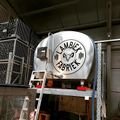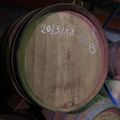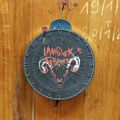Lambiek Fabriek: Difference between revisions
No edit summary |
|||
| (29 intermediate revisions by 4 users not shown) | |||
| Line 1: | Line 1: | ||
[[File:Logo Lambiek Fabriek - lambiekfabriek vof.png| | [[File:Logo Lambiek Fabriek - lambiekfabriek vof.png|400px|right]] | ||
'''Website:''' http://www.lambiekfabriek.be/ | '''Website:''' http://www.lambiekfabriek.be/ | ||
''' | '''Instagram:''' @lambiek_fabriek | ||
'''Address:''' | '''Contact:''' [mailto:info@lambiekfabriek.be info@lambiekfabriek.be] | ||
'''Address:''' Eugène Ghijsstraat 71, 1600 Sint-Pieters-Leeuw | |||
== Overview == | == Overview == | ||
Lambiek Fabriek is a lambic | Lambiek Fabriek is a lambic producer founded by Jo Panneels and Jozef Van Bosstraeten in 2016, and is located in Sint-Pieters-Leeuw. “Fabriek” represents their original brew site in the “Fabriekstraat” in Ruisbroek (Sint-Pieters-Leeuw). The ram skull logo and the round shaped labels were specifically chosen to step away from the classic (paint stripe) labels on the market, thus giving Lambiek Fabriek its own identity. Another feature representing Lambiek Fabriek’s identity on the market is that all of the products in their lineup end with “-Elle”. | ||
== History== | == History== | ||
[[File:Lambiek Fabriek | [[File:Lambiek Fabriek Jozef and Jo.jpg|Jozef Van Bosstraeten & Jo Panneels|thumb|left]] | ||
Jo Panneels and Jozef Van Bosstraeten raised the idea of starting their own lambic brewery whilst drinking geuze in a café in the Pajottenland. Back in the mid-2000s, Jo Panneels worked in the retail business and Jozef Van Bosstraeten worked as a plasterer. Each year the two friends (who have known each other since childhood) went to France to help the winemakers with the grape harvest in the Burgundy region. The winemakers were intrigued when they found out about the friends’ lambic project, and offered some oak barrels of both 400 L and 220 L sizes. Lambic wort could relatively easily be sourced around the mid-2000s, because it was not as popular as it is nowadays. The Lambiek Fabriek founders had not grown up in a brewing family, but gained their technical beer knowledge by taking professional classes in COOVI Anderlecht, which is a school specialized in the catering industry. | |||
A two stories high garage in the Fabriekstraat in Ruisbroek (Sint-Pieters-Leeuw) was transformed into a warehouse where Jo & Jozef could produce their first lambic around 2006–07. Between 2008 and 2015, the future Lambiek Fabriek founders purchased some wort, young lambic, and old lambic from: [[Brouwerij_Lindemans|Lindemans]], [[Brouwerij_3_Fonteinen|3 Fonteinen]], [[Brouwerij Oud Beersel]], and [[Hanssens Artisanaal bvba]]. They began to experiment making only kriek lambic in small 20 L and 60 L carboys for non-commercial use. While beginning to contemplate the logistics of blending lambic commercially, lambic was at the same time in one of its most popular and rapid upswings in popularity. This made the market for lambic wort from other producers much tighter due to demand at their own breweries and blenderies, as well as making any available wort more expensive. | |||
By 2015, the decision had been made to start a new commercial-sized lambic brewery. Their tasks were quickly defined because the two friends know each other for over 30 years and know how to work complementary. They agreed on Jozef Van Bosstraeten taking on the role of master brewer, and Jo Panneels as zythologist assisting in blending and responsible for all non-production tasks such as: finance, sales & marketing distribution,... Given the fact that they were not able to purchase wort from the bigger lambic brewers at the time, Jo Paneels approached a clean top fermentation brewery in Zuun (Sint-Pieters-Leeuw) to let Lambiek Fabriek brew lambic on-premises. In the beginning of the brewing sessions, the coolship was not present at the brewery. Instead, it was located at their original warehouse in Ruisbroek, approximately 3 km away from the brewery. The first two seasons (2015-16 and 2016-17), freshly brewed wort was transported approximately 4.5 km away from the brewery to another warehouse where it was pumped into the coolship to cool overnight. Logistically, this was a strain. To solve the problem of having spontaneous fermentation alongside a clean brewery, a separate warehouse was chosen on-site to house the barrels and all of the necessary pumps and hoses. Eventually, it was decided that the coolship should be moved to the brewery for logistical reasons, and it was installed under a roof outside of the brewery in the fall of 2017 so as to not interfere with the clean fermentation at the brewery. | |||
[[File:Lambiek Fabriek barrel room Ruisbroek.jpg|Lambiek Fabriek’s barrel room in Ruisbroek|thumb|right]] | |||
[[File:Lambiek Fabriek | |||
In 2020, Lambiek Fabriek also joined [[HORAL|HORAL]], a non-profit organization that groups the lambic producers in the Pajottenland and the Valley of the Senne. The [[HORAL|HORAL]] Megablend 2021 and 2022 both contain lambic brewed by Lambiek Fabriek. A relocation to a new and bigger warehouse became necessary, and Lambiek Fabriek’s main site is once again in Ruisbroek since 2022. The main site serves for storage and bottling, whereas the garage warehouse where it all started over a decade ago is still used to store barrels. The fruit and bottles are stored in their warehouse in Lot (Beersel). For the 2021–22 season, Jozef Van Bosstraeten brewed Lambiek Fabriek's lambic by making use of other lambic producers' brewing equipment at their brew sites, being: [[Brouwerij_De_Troch|De Troch]], [[Brouwerij_3_Fonteinen|3 Fonteinen]], [[Den_Herberg|Den Herberg]] and [[Brouwerij_Lindemans|Lindemans]]. The products in the lineup are all blends from the aforementioned 4 lambic breweries, as well as Lambiek Fabriek's own brewed lambic that was produced at their previous brew site in Zuun. | |||
==Brewing and Blending Process== | ==Brewing and Blending Process== | ||
The lambic | The lambic which Lambiek Fabriek brews is based on a traditional lambic recipe that consists of approximately +/- 35% wheat and +/- 65% malted barley and uses aged pellet hops. The stainless steel coolship that Lambiek Fabriek used in Zuun during the seasons 2016–2021 was fabricated locally and is divided into two equal halves of 1,200 L each, thus a full brew filled the coolship. The wort is then pumped over at approximately 95º C and left to cool until it is transferred over to barrels at around 22-23º C. Jo Panneels assists master brewer Jozef Van Bosstraeten with blending, and each bottling contains 5,000 L. Bottling is done semi-automatically on site in Ruisbroek at a rate of 1,300 bottles per hour. Putting capsules on the bottles is the only manual labor in the bottling process. | ||
Jozef Van Bosstraeten is not only Lambiek Fabriek’s master brewer, but he is also a cooper. Lambiek Fabriek finds it important to have an in-house cooper, in order to maintain the barrels and foeders without needing to rely on an external party. Many of the French oak barrels are first-fill barrels coming from the Burgundy region in France, where Lambiek Fabriek has a connection to some winemakers. In 2022, there are about 210 barrels (180 x 400 liter and 30 x 220 liter sizes) across the two warehouses, as well as 12 foeders which originate from Italy and Austria. All foeders were between 30-40 years old at the time of purchase. The 8 smallest foeders have a capacity of 47 hl each, one of 65 hl, and the 3 biggest foeders can contain 70 hl each. The geuze is a blend of lambic aged in 400 L barrels, whereas the fruit lambics are a combination of lambic aged in barrels (of different sizes) and foeders. Some barrels are marked with a capital “B” to indicate that the lambic inside has been made from organic grains. The 100% organic lambic is for instance used in “Natur-Elle” and “Organic & Wild Black-Belle”. | |||
== Beers == | == Beers == | ||
=== Geuze === | === Geuze === | ||
*[[Brett-Elle Oude Geuze]] | *[[Brett-Elle Oude Geuze]] | ||
*[[ | *[[Fontan-Elle Young & Wild]] | ||
*[[Natur-Elle Organic Geuze]] | |||
*[[Bord-Elle Oude Geuze]] | |||
*[[Colon-Elle Single & Wild]] | |||
===Fruit=== | |||
*[[Oude Kriek Jart-Elle]] | |||
*[[Oude Kriek Schar-Elle]] | |||
*[[Juicy & Wild Black-Belle]] | |||
*[[Organic & Wild Black-Belle]] | |||
*[[Juicy & Wild Muri-Elle]] | |||
*[[Juicy & Wild Muscar-Elle]] | |||
*[[Juicy & Wild Pluri-Elle]] | |||
*[[Juicy & Wild Gross-Elle]] | |||
*[[Juicy & Wild Rhub-Elle]] | |||
== Photos == | == Photos == | ||
<gallery> | <gallery> | ||
File:Lambiek Fabriek | File:Lambiek Fabriek entrance.jpg|Entrance in Ruisbroek | ||
File:Lambiek Fabriek | File:Lambiek Fabriek warehouse Ruisbroek.jpg|Barrel room in Ruisbroek | ||
File:Lambiek Fabriek | File:Lambiek Fabriek barrel room Ruisbroek2.jpg|Barrel room in Ruisbroek | ||
File:Lambiek Fabriek | File:Lambiek Fabriek tank in warehouse.jpg|Warehouse | ||
File: | File:Lambiek Fabriek foeder.jpg|Foeder | ||
File:Lambiek Fabriek | File:Lambiek Fabriek barrel maintenance.jpg|Barrel maintenance | ||
File:Lambiek Fabriek fermentation.JPG|Fermentation | |||
File:Lambiek Fabriek fermentation2.jpg|Fermentation | |||
File:Lambiek Fabriek Organic Lambic.jpg|Barrel of organic lambic | File:Lambiek Fabriek Organic Lambic.jpg|Barrel of organic lambic | ||
File:Lambiek Fabriek tasting blends.jpg|Lambic blends | |||
File:Lambiek Fabriek ram skull.jpg|Ram skull | |||
File:Lambiek Fabriek dart board.jpg|Dart board | |||
</gallery> | </gallery> | ||
Latest revision as of 15:42, 13 April 2025

Website: http://www.lambiekfabriek.be/
Instagram: @lambiek_fabriek
Contact: info@lambiekfabriek.be
Address: Eugène Ghijsstraat 71, 1600 Sint-Pieters-Leeuw
Overview
Lambiek Fabriek is a lambic producer founded by Jo Panneels and Jozef Van Bosstraeten in 2016, and is located in Sint-Pieters-Leeuw. “Fabriek” represents their original brew site in the “Fabriekstraat” in Ruisbroek (Sint-Pieters-Leeuw). The ram skull logo and the round shaped labels were specifically chosen to step away from the classic (paint stripe) labels on the market, thus giving Lambiek Fabriek its own identity. Another feature representing Lambiek Fabriek’s identity on the market is that all of the products in their lineup end with “-Elle”.
History
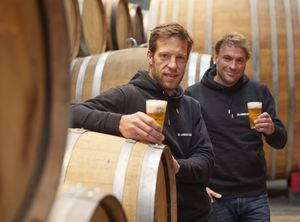
Jo Panneels and Jozef Van Bosstraeten raised the idea of starting their own lambic brewery whilst drinking geuze in a café in the Pajottenland. Back in the mid-2000s, Jo Panneels worked in the retail business and Jozef Van Bosstraeten worked as a plasterer. Each year the two friends (who have known each other since childhood) went to France to help the winemakers with the grape harvest in the Burgundy region. The winemakers were intrigued when they found out about the friends’ lambic project, and offered some oak barrels of both 400 L and 220 L sizes. Lambic wort could relatively easily be sourced around the mid-2000s, because it was not as popular as it is nowadays. The Lambiek Fabriek founders had not grown up in a brewing family, but gained their technical beer knowledge by taking professional classes in COOVI Anderlecht, which is a school specialized in the catering industry.
A two stories high garage in the Fabriekstraat in Ruisbroek (Sint-Pieters-Leeuw) was transformed into a warehouse where Jo & Jozef could produce their first lambic around 2006–07. Between 2008 and 2015, the future Lambiek Fabriek founders purchased some wort, young lambic, and old lambic from: Lindemans, 3 Fonteinen, Brouwerij Oud Beersel, and Hanssens Artisanaal bvba. They began to experiment making only kriek lambic in small 20 L and 60 L carboys for non-commercial use. While beginning to contemplate the logistics of blending lambic commercially, lambic was at the same time in one of its most popular and rapid upswings in popularity. This made the market for lambic wort from other producers much tighter due to demand at their own breweries and blenderies, as well as making any available wort more expensive.
By 2015, the decision had been made to start a new commercial-sized lambic brewery. Their tasks were quickly defined because the two friends know each other for over 30 years and know how to work complementary. They agreed on Jozef Van Bosstraeten taking on the role of master brewer, and Jo Panneels as zythologist assisting in blending and responsible for all non-production tasks such as: finance, sales & marketing distribution,... Given the fact that they were not able to purchase wort from the bigger lambic brewers at the time, Jo Paneels approached a clean top fermentation brewery in Zuun (Sint-Pieters-Leeuw) to let Lambiek Fabriek brew lambic on-premises. In the beginning of the brewing sessions, the coolship was not present at the brewery. Instead, it was located at their original warehouse in Ruisbroek, approximately 3 km away from the brewery. The first two seasons (2015-16 and 2016-17), freshly brewed wort was transported approximately 4.5 km away from the brewery to another warehouse where it was pumped into the coolship to cool overnight. Logistically, this was a strain. To solve the problem of having spontaneous fermentation alongside a clean brewery, a separate warehouse was chosen on-site to house the barrels and all of the necessary pumps and hoses. Eventually, it was decided that the coolship should be moved to the brewery for logistical reasons, and it was installed under a roof outside of the brewery in the fall of 2017 so as to not interfere with the clean fermentation at the brewery.
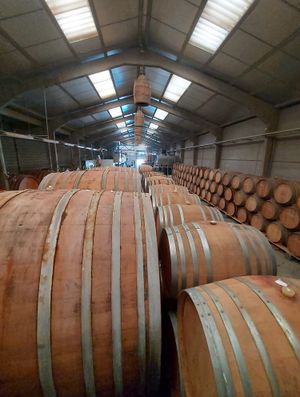
In 2020, Lambiek Fabriek also joined HORAL, a non-profit organization that groups the lambic producers in the Pajottenland and the Valley of the Senne. The HORAL Megablend 2021 and 2022 both contain lambic brewed by Lambiek Fabriek. A relocation to a new and bigger warehouse became necessary, and Lambiek Fabriek’s main site is once again in Ruisbroek since 2022. The main site serves for storage and bottling, whereas the garage warehouse where it all started over a decade ago is still used to store barrels. The fruit and bottles are stored in their warehouse in Lot (Beersel). For the 2021–22 season, Jozef Van Bosstraeten brewed Lambiek Fabriek's lambic by making use of other lambic producers' brewing equipment at their brew sites, being: De Troch, 3 Fonteinen, Den Herberg and Lindemans. The products in the lineup are all blends from the aforementioned 4 lambic breweries, as well as Lambiek Fabriek's own brewed lambic that was produced at their previous brew site in Zuun.
Brewing and Blending Process
The lambic which Lambiek Fabriek brews is based on a traditional lambic recipe that consists of approximately +/- 35% wheat and +/- 65% malted barley and uses aged pellet hops. The stainless steel coolship that Lambiek Fabriek used in Zuun during the seasons 2016–2021 was fabricated locally and is divided into two equal halves of 1,200 L each, thus a full brew filled the coolship. The wort is then pumped over at approximately 95º C and left to cool until it is transferred over to barrels at around 22-23º C. Jo Panneels assists master brewer Jozef Van Bosstraeten with blending, and each bottling contains 5,000 L. Bottling is done semi-automatically on site in Ruisbroek at a rate of 1,300 bottles per hour. Putting capsules on the bottles is the only manual labor in the bottling process.
Jozef Van Bosstraeten is not only Lambiek Fabriek’s master brewer, but he is also a cooper. Lambiek Fabriek finds it important to have an in-house cooper, in order to maintain the barrels and foeders without needing to rely on an external party. Many of the French oak barrels are first-fill barrels coming from the Burgundy region in France, where Lambiek Fabriek has a connection to some winemakers. In 2022, there are about 210 barrels (180 x 400 liter and 30 x 220 liter sizes) across the two warehouses, as well as 12 foeders which originate from Italy and Austria. All foeders were between 30-40 years old at the time of purchase. The 8 smallest foeders have a capacity of 47 hl each, one of 65 hl, and the 3 biggest foeders can contain 70 hl each. The geuze is a blend of lambic aged in 400 L barrels, whereas the fruit lambics are a combination of lambic aged in barrels (of different sizes) and foeders. Some barrels are marked with a capital “B” to indicate that the lambic inside has been made from organic grains. The 100% organic lambic is for instance used in “Natur-Elle” and “Organic & Wild Black-Belle”.
Beers
Geuze
- Brett-Elle Oude Geuze
- Fontan-Elle Young & Wild
- Natur-Elle Organic Geuze
- Bord-Elle Oude Geuze
- Colon-Elle Single & Wild
Fruit
- Oude Kriek Jart-Elle
- Oude Kriek Schar-Elle
- Juicy & Wild Black-Belle
- Organic & Wild Black-Belle
- Juicy & Wild Muri-Elle
- Juicy & Wild Muscar-Elle
- Juicy & Wild Pluri-Elle
- Juicy & Wild Gross-Elle
- Juicy & Wild Rhub-Elle
Photos
-
Entrance in Ruisbroek
-
Barrel room in Ruisbroek
-
Barrel room in Ruisbroek
-
Warehouse
-
Foeder
-
Barrel maintenance
-
Fermentation
-
Fermentation
-
Barrel of organic lambic
-
Lambic blends
-
Ram skull
-
Dart board



